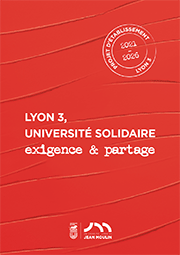AccueilRechercheProgrammes et productions scientifiquesThèsesThèses soutenuesThèses soutenues - 2006-2021Thèses soutenues - 2014
-
Partager cette page
- Recherche,
ALSHATTI Mohammad
L’argumentation dans la pensée d’al-Ghaz?l? et d’Ibn Rushd
Publié le 28 novembre 2014 – Mis à jour le 21 décembre 2018
Thèse en Etudes arabes et islamiques soutenue le 20 décembre 2014.
La question de la philosophie et de la religion que nous allons traiter ici n’a cessé, depuis le troisième siècle de l’hégire jusqu’à nos jours, de préoccuper les chercheurs de tous bords et de toutes origines. Il ne fait aucun doute que celui qui entreprend une recherche dans ce domaine va devoir faire face à de vraies difficultés. En effet, faire la différence entre les philosophes, les religieux et les théologiens n’est pas chose aisée. La religion et la philosophie sont considérées comme des activités de réflexion qui tentent chacune, avec ardeur et selon sa méthode propre, d’atteindre la vérité. Elles aident l’individu à comprendre les énigmes de la vie, sa complexité, certains secrets qu’elle comporte, et à vivre une vie naturelle.
La religion vise à aider ses adeptes à bénéficier de la vie, à composer avec la réalité et ses différents niveaux de complexité, à travers une incitation et de fa?on consciente. Elle les pousse aussi à considérer cette vie d’ici-bas comme une station avant une autre vie. Quant à la philosophie, elle cherche à aider ses partisans à jouir de la vie en les exhortant à faire face à leurs difficultés croissantes, à développer leurs capacités rationnelles et à pratiquer la contemplation consciente, de même que la réflexion scientifique. Elle ne considère pas que l’homme doive abandonner cette vie pour une vie future promise par la religion.
Ainsi, la philosophie peut saisir la vie de manière générale et expliquer ses subtilités, mais elle ne peut pas inventer une société différente des autres, harmonieuse et régie par les mêmes valeurs. La religion se distingue en revanche par sa capacité à créer des sociétés cohérentes qui partagent les mêmes dogmes, les mêmes valeurs et les mêmes traditions qui garantissent l’unité. Ainsi, si la religion vise à établir des sociétés vertueuses, la philosophie n’a pas vocation à b?tir des sociétés se fondant ou non sur des valeurs. Cependant, ni la religion ni la philosophie ou toute autre idéologie sociale ou politique ne peuvent ne pas subir la logique de l’histoire et son évolution permanente.
Nous avons étudié cette question chez deux philosophes du cinquième et du sixième siècle de l’hégire, à savoir al-Ghaz?l? et Ibn Rushd, du fait que cette époque a été une période charnière dans l’histoire de la philosophie islamique
al-Ghaz?l? un jurisconsulte, un spécialiste des fondements du droit, un philosophe et un des plus célèbres penseurs de l’islam. Il a vécu dans la deuxième moitié du cinquième siècle de l’hégire c'est-à-dire, durant la période que les historiens qualifient de la troisième époque abbasside. Ibn Rushd, lui aussi, philosophe, médecin jurisconsulte et juge est né en 1126. En effet, il a passé son enfance et une partie de sa jeunesse sous le pouvoir des almoravides, et le reste de sa vie sous la dynastie des almohades.
al-Ghaz?l? et Ibn Rushd sont deux grandes écoles de pensée qui représentent l’Orient et le Maghreb. Ils ont beaucoup écrit, et grandement contribué à l’évolution de la philosophie islamique, et à la progression du dialogue entre la rationalité et la spiritualité. al-Ghaz?l? a critiqué les philosophes sur leurs positions qui étaient en contradiction avec les fondements du dogme islamique, et cela sur des points précis qu’il a exposé dans son ouvrage Tah?fut al-fal?sifa. Ces critiques portent, comme il l’indique lui-même, sur les fausses conclusions fondées sur des hypothèses justes et inversement sur des conclusions exactes à partir d’hypothèses fausses.
En effet, al-Ghaz?l? accuse les philosophes de manque de précision dans leur argumentation. Ainsi, il fait remarquer que même si les philosophes connaissent bien la démonstration, ils l’utilisent mal, ce qui les a conduits à produire des choses contraires à ce qu’ils prétendaient. Quant à Ibn Rushd, il s’est limité dans sa critique adressé à al-Ghaz?l?, à ce que ce dernier a écrit dans son ouvrage, et seulement sur certaines questions qui sont relatives à sa démarche méthodologique. Ibn Rushd considère l’intitulé de l’ouvrage d’al-Ghaz?l? Tah?fut al-fal?sifa comme partitif, c'est-à-dire que chez al-Ghaz?l?, tout chez les philosophes n’est pas incohérents.
Dans la pensée islamique, certains savants anciens avaient l’habitude de mettre des barrières entre la spiritualité d’al-Ghaz?l? et la rationnalité d’Ibn Rushd. D’aucuns ont estimé qu’al-Ghaz?l? a achevé la raison philosophique islamique, et d’autres défendent la nécessité de promouvoir la rationalité d’Ibn Rushd. Toutefois, nous pensons que cette opposition n’a pas de raison d’être, d’autant plus qu’il est avéré que la rationalité d’Ibn Rushd et la spiritualité d’al-Ghaz?l? sont nécessaires et fondamentales pour la recherche de la vérité d’ici bas et celle de l’au-delà.
The question of philosophy and religion we are treating here has continuously been preoccupying researchers from all sides and from all backgrounds, since the third century AH until now. There is no doubt that those who undertake research in this area will have to face real difficulties. Indeed, making the difference between the philosophers, the theologians and the religious people is not an easy task. Religion and philosophy are considered reflective activities that attempt both, in their own way, to reach the truth with enthusiasm. They help the individual to understand the riddles of life, its complexity, some secrets it has, and to live a natural life.
Religion aims to help its followers to enjoy life, to deal with reality and its different levels of complexity, consciously and through an incentive. It also urges them to consider this earthly life as a station before another life. As for philosophy, it seeks to help its supporters to enjoy life, urging them to cope with their increasing difficulties, to develop their rational capacities and to practise conscious contemplation, as well as scientific thinking. It does not consider that man must give up this life for a future life promised by religion.
Thus, philosophy can capture life in general and explain its subtleties, but it cannot invent a society different from others, harmonious and governed by the same values. Religion stands in contrast with its ability to create cohesive societies sharing the same dogma, the same values and the same traditions that ensure unity. Thus, if the religion aims to establish virtuous societies, philosophy is not intended to build societies based on values or not. However, neither religion nor philosophy or any other social or political ideology can avoid undergoing the logic of history and its constant evolution.
We studied this question in two philosophers of the fifth and sixth century of the Hegira, namely Al-Ghaz?l? and Ibn Rushd, considering the fact that that era was a pivotal period in the history of Islamic philosophy.
Al-Ghaz?l?, a legal adviser, a specialist of the foundations of law, a philosopher and one of the most famous thinkers of Islam. He lived in the second half of the fifth century AH that i.e. during the period historians call the third Abbasid era. Ibn Rushd, a philosopher too, a physician and legal adviser was born in 1126. In fact, he spent his childhood and part of his youth in the power of the Almoravids and the rest of his life under the Almohad dynasty.
Al-Ghaz?l? and Ibn Rushd are two major schools of thought that represent the East and the Maghreb. They wrote, and contributed a lot to the development of Islamic philosophy and the progression of the dialogue between rationality and spirituality. Al-Ghaz?l?, on specific points outlined in his book al-Tahafutfal?sifa, criticized philosophers in their positions that were in contradiction with the fundamentals of Islamic dogma. These criticisms are, as he says himself, are about the false conclusions based on valid assumptions and on the other side on accurate conclusions based on false assumptions.
Indeed, Al-Ghaz?l? accuses philosophers of lack of precision in their argument. Thus, he noted that even though philosophers are familiar with the demonstration, they use it badly, which led them to produce things contrary to what they pretended. As for Ibn Rushd, in his criticism addressed to Al-Ghaz?l?, he limited himself to what the latter wrote in his book, and only on some issues related to his methodological approach. Ibn Rushd considers the title of Al-Ghaz?l? al-Tahafutfal?sifa's work portative, in the sense that fo rAl-Ghaz?l?, everything is not inconsistent in philosophers.
In Islamic thought, some ancient scholars used to put barriers between Al-Ghaz?l?'s spirituality and Ibn Rushd's rationality. Some have argued that Al-Ghaz?l? completed the Islamic philosophical reason, and others are defending the need to promote Ibn Rushd's rationality. However, we believe that the opposition has no reason to be, especially as it’s proven true that Ibn Rushd's spirituality and Al-Ghaz?l?'s rationality are necessary and fundamental to the pursuit of truth in this world and the hereafter.
Mots-Clés : L’argumentation / la pensée / al-Ghaz?l? / Ibn Rushd
Keywords : The argument / the thought / al-Ghazali / Ibn Rushd
Directeur de thèse : Henri-Hassan SAHLOUL
Membres du jury :
Laurence DENOOZ, Professeur, Université de Lorraine
Elisabeth VAUTHIER, Professeur émérite, Université de Rennes II
Floréal SANAGUSTIN, Professeur, Université Lumière Lyon 2
Marc GEOFFROY, Chargé de recherches au CNRS
Kamal TAYARA, Ma?tre de conférences HDR, Université Jean Moulin Lyon 3
Henri-Hassan SAHLOUL, Professeur, Université Jean Moulin Lyon 3
Présidente du jury : Laurence DENOOZ
Equipe d'accueil : Francophonie
La religion vise à aider ses adeptes à bénéficier de la vie, à composer avec la réalité et ses différents niveaux de complexité, à travers une incitation et de fa?on consciente. Elle les pousse aussi à considérer cette vie d’ici-bas comme une station avant une autre vie. Quant à la philosophie, elle cherche à aider ses partisans à jouir de la vie en les exhortant à faire face à leurs difficultés croissantes, à développer leurs capacités rationnelles et à pratiquer la contemplation consciente, de même que la réflexion scientifique. Elle ne considère pas que l’homme doive abandonner cette vie pour une vie future promise par la religion.
Ainsi, la philosophie peut saisir la vie de manière générale et expliquer ses subtilités, mais elle ne peut pas inventer une société différente des autres, harmonieuse et régie par les mêmes valeurs. La religion se distingue en revanche par sa capacité à créer des sociétés cohérentes qui partagent les mêmes dogmes, les mêmes valeurs et les mêmes traditions qui garantissent l’unité. Ainsi, si la religion vise à établir des sociétés vertueuses, la philosophie n’a pas vocation à b?tir des sociétés se fondant ou non sur des valeurs. Cependant, ni la religion ni la philosophie ou toute autre idéologie sociale ou politique ne peuvent ne pas subir la logique de l’histoire et son évolution permanente.
Nous avons étudié cette question chez deux philosophes du cinquième et du sixième siècle de l’hégire, à savoir al-Ghaz?l? et Ibn Rushd, du fait que cette époque a été une période charnière dans l’histoire de la philosophie islamique
al-Ghaz?l? un jurisconsulte, un spécialiste des fondements du droit, un philosophe et un des plus célèbres penseurs de l’islam. Il a vécu dans la deuxième moitié du cinquième siècle de l’hégire c'est-à-dire, durant la période que les historiens qualifient de la troisième époque abbasside. Ibn Rushd, lui aussi, philosophe, médecin jurisconsulte et juge est né en 1126. En effet, il a passé son enfance et une partie de sa jeunesse sous le pouvoir des almoravides, et le reste de sa vie sous la dynastie des almohades.
al-Ghaz?l? et Ibn Rushd sont deux grandes écoles de pensée qui représentent l’Orient et le Maghreb. Ils ont beaucoup écrit, et grandement contribué à l’évolution de la philosophie islamique, et à la progression du dialogue entre la rationalité et la spiritualité. al-Ghaz?l? a critiqué les philosophes sur leurs positions qui étaient en contradiction avec les fondements du dogme islamique, et cela sur des points précis qu’il a exposé dans son ouvrage Tah?fut al-fal?sifa. Ces critiques portent, comme il l’indique lui-même, sur les fausses conclusions fondées sur des hypothèses justes et inversement sur des conclusions exactes à partir d’hypothèses fausses.
En effet, al-Ghaz?l? accuse les philosophes de manque de précision dans leur argumentation. Ainsi, il fait remarquer que même si les philosophes connaissent bien la démonstration, ils l’utilisent mal, ce qui les a conduits à produire des choses contraires à ce qu’ils prétendaient. Quant à Ibn Rushd, il s’est limité dans sa critique adressé à al-Ghaz?l?, à ce que ce dernier a écrit dans son ouvrage, et seulement sur certaines questions qui sont relatives à sa démarche méthodologique. Ibn Rushd considère l’intitulé de l’ouvrage d’al-Ghaz?l? Tah?fut al-fal?sifa comme partitif, c'est-à-dire que chez al-Ghaz?l?, tout chez les philosophes n’est pas incohérents.
Dans la pensée islamique, certains savants anciens avaient l’habitude de mettre des barrières entre la spiritualité d’al-Ghaz?l? et la rationnalité d’Ibn Rushd. D’aucuns ont estimé qu’al-Ghaz?l? a achevé la raison philosophique islamique, et d’autres défendent la nécessité de promouvoir la rationalité d’Ibn Rushd. Toutefois, nous pensons que cette opposition n’a pas de raison d’être, d’autant plus qu’il est avéré que la rationalité d’Ibn Rushd et la spiritualité d’al-Ghaz?l? sont nécessaires et fondamentales pour la recherche de la vérité d’ici bas et celle de l’au-delà.
The question of philosophy and religion we are treating here has continuously been preoccupying researchers from all sides and from all backgrounds, since the third century AH until now. There is no doubt that those who undertake research in this area will have to face real difficulties. Indeed, making the difference between the philosophers, the theologians and the religious people is not an easy task. Religion and philosophy are considered reflective activities that attempt both, in their own way, to reach the truth with enthusiasm. They help the individual to understand the riddles of life, its complexity, some secrets it has, and to live a natural life.
Religion aims to help its followers to enjoy life, to deal with reality and its different levels of complexity, consciously and through an incentive. It also urges them to consider this earthly life as a station before another life. As for philosophy, it seeks to help its supporters to enjoy life, urging them to cope with their increasing difficulties, to develop their rational capacities and to practise conscious contemplation, as well as scientific thinking. It does not consider that man must give up this life for a future life promised by religion.
Thus, philosophy can capture life in general and explain its subtleties, but it cannot invent a society different from others, harmonious and governed by the same values. Religion stands in contrast with its ability to create cohesive societies sharing the same dogma, the same values and the same traditions that ensure unity. Thus, if the religion aims to establish virtuous societies, philosophy is not intended to build societies based on values or not. However, neither religion nor philosophy or any other social or political ideology can avoid undergoing the logic of history and its constant evolution.
We studied this question in two philosophers of the fifth and sixth century of the Hegira, namely Al-Ghaz?l? and Ibn Rushd, considering the fact that that era was a pivotal period in the history of Islamic philosophy.
Al-Ghaz?l?, a legal adviser, a specialist of the foundations of law, a philosopher and one of the most famous thinkers of Islam. He lived in the second half of the fifth century AH that i.e. during the period historians call the third Abbasid era. Ibn Rushd, a philosopher too, a physician and legal adviser was born in 1126. In fact, he spent his childhood and part of his youth in the power of the Almoravids and the rest of his life under the Almohad dynasty.
Al-Ghaz?l? and Ibn Rushd are two major schools of thought that represent the East and the Maghreb. They wrote, and contributed a lot to the development of Islamic philosophy and the progression of the dialogue between rationality and spirituality. Al-Ghaz?l?, on specific points outlined in his book al-Tahafutfal?sifa, criticized philosophers in their positions that were in contradiction with the fundamentals of Islamic dogma. These criticisms are, as he says himself, are about the false conclusions based on valid assumptions and on the other side on accurate conclusions based on false assumptions.
Indeed, Al-Ghaz?l? accuses philosophers of lack of precision in their argument. Thus, he noted that even though philosophers are familiar with the demonstration, they use it badly, which led them to produce things contrary to what they pretended. As for Ibn Rushd, in his criticism addressed to Al-Ghaz?l?, he limited himself to what the latter wrote in his book, and only on some issues related to his methodological approach. Ibn Rushd considers the title of Al-Ghaz?l? al-Tahafutfal?sifa's work portative, in the sense that fo rAl-Ghaz?l?, everything is not inconsistent in philosophers.
In Islamic thought, some ancient scholars used to put barriers between Al-Ghaz?l?'s spirituality and Ibn Rushd's rationality. Some have argued that Al-Ghaz?l? completed the Islamic philosophical reason, and others are defending the need to promote Ibn Rushd's rationality. However, we believe that the opposition has no reason to be, especially as it’s proven true that Ibn Rushd's spirituality and Al-Ghaz?l?'s rationality are necessary and fundamental to the pursuit of truth in this world and the hereafter.
Mots-Clés : L’argumentation / la pensée / al-Ghaz?l? / Ibn Rushd
Keywords : The argument / the thought / al-Ghazali / Ibn Rushd
Directeur de thèse : Henri-Hassan SAHLOUL
Membres du jury :
Laurence DENOOZ, Professeur, Université de Lorraine
Elisabeth VAUTHIER, Professeur émérite, Université de Rennes II
Floréal SANAGUSTIN, Professeur, Université Lumière Lyon 2
Marc GEOFFROY, Chargé de recherches au CNRS
Kamal TAYARA, Ma?tre de conférences HDR, Université Jean Moulin Lyon 3
Henri-Hassan SAHLOUL, Professeur, Université Jean Moulin Lyon 3
Présidente du jury : Laurence DENOOZ
Equipe d'accueil : Francophonie
Documentation
Mise à jour : 21 décembre 2018







